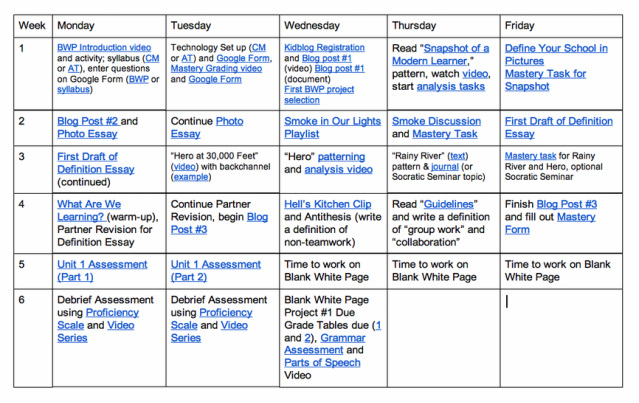I think about where my students started. Where Andrew and I started.
We had so many ideas. So much hope.
And we failed SO much.
When the semester started, we had TECHNOLOGY and MASTERY and CROSS-COUNTRY COLLABORATION...
...but we forgot to build a classroom community that could sustain those major changes. We forgot that our students needed to know us, not just be in the room with us. We forgot that our students needed a reason for the technology we were using, rather than just being told it was important.
When things didn't work according to our Master Plan, we had two choices: give up or fight back.
Well, really we had four choices: give up on everything, give up on each other and just go it alone in the classroom, fight back against each other and let that destroy our classroom along with our relationship, or to redouble our efforts and fight side-by-side to fix the problems.
We chose side-by-side. And after a lot of hard work - on ourselves, on our partnership, on our friendship, and on our practice in the classroom - we started to turn the corner.
Today I saw evidence of that.
3rd period has been my most challenging class in many ways. I have 2 sets of identical twins, a 35% SPED rate, 6 girls out of 30 students, and a group who seemed to fight me every step of the way. But today, we had a final seminar about the nature of humour, on the course and what they learned, and what I should do next semester so my students can get an even better teacher and classroom.
Here's some of what they said:
- You guided us in this course, but we were the ones who were driving the curriculum. Whatever we needed, you helped us find. Whatever we were interested in, you used it to help us get better.
- After our "Come to Jesus" talk in October (the one where we established the norms we needed for class to run successfully), we all started to feel like we were responsible for our learning. We knew what we were supposed to do, but you didn't force us to change. We established the patterns of change for ourselves and you helped us take ownership of those changes.
- We've never had a course in English where we felt like it was relevant to our lives in the way this one was. Everything we did in here was helpful in a way that we can translate to other classes, to college and to careers.
- We got to decipher what made something funny - and instead of killing the joke, it allowed us to understand it better. And we got to produce funny stuff - including a pretty epic Socratic Seminar todaysmeet thread from this final discussion, that became a true work of humour in and of itself.
- The writing we did in this class was much more creative than the writing we've done before, but we also get the freedom to try out different styles and voices and see how they fit for us. We got to take risks, and we didn't have to be afraid that our grades would suffer.
- All that being said, we expected this to be a joke of a class (pun intended, obviously). We expected it to be sitting around, watching YouTube videos, and not doing much. But this class wasn't an easy A - you had to work really hard and learn a lot to get an A. The pace was really fast, but if you used class time well, you would never have to do any work out of class.
Their message was clear:
This class was successful because WE were successful. Change a few things to streamline the process. But we learned, we took ownership, we were inspired, and we wish we could keep going until June.
Me too.
**
I didn't have to stand up and lecture to teach them something of value. I also didn't have to make them write 10 pages essays to get them to be analytical and critical thinkers. I didn't have to push them to be creative either - I just had to remove the restrictions that kept them constrained.
I'm not saying that this semester was a complete success.
There was one more thing that happened today that reminded me of why I teach this way.
It's a student that hadn't talked to me much. He always did the work, but sometimes it felt like he was a little checked out. He came in after school today and told me that he wanted to get the chance to tell me personally how much the class had meant to him. He learned a lot, he appreciated me and the way the class was run, and he really hoped he would be in my class again next semester. We looked up his schedule and both were pretty excited to see that he was staying with me in San Francisco Stories next semester.
This all happened while I was on the customary afternoon G+ hangout with Andrew. Andrew said that he wished he had been faster so he could have recorded it because it crystalised exactly what we wanted:
A student who had been transformed by our class.
And in a few weeks, we start over. But we start with a few kids just like him, bought in, passionate, and skilled, we will get a pretty good head-start.



 RSS Feed
RSS Feed
